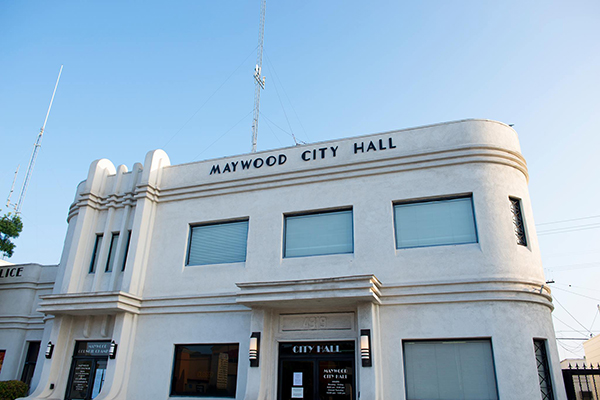By Alfredo Santana
Contributing Writer
MAYWOOD — The city has been removed from the state Auditor’s Office list of cities with a high-risk financial status, which the city has been on since 2016.
The announcement followed a recent state audit that indicated the city has improved its hiring and oversight process for the city manager, which includes “establishing a comprehensive hiring policy and evaluating” her performance.
In a letter addressed to Gov. Gavin Newsom and legislative leaders in Sacramento, acting California State Auditor Michael Tilden wrote that the city’s financial management had been strengthened by avoiding ongoing deficits and has improved its budget policies.
“We now classify the city as being at only moderate fiscal risk.” Tilden said.
According to audited financial statements, Maywood reported general fund revenues of $15 million in 2020-21, compared to $12.5 million the previous fiscal year, an increase driven in part by sale tax revenues from the cannabis industry.
Until 2015, Maywood had incurred overdue debts for more than $15 million, twice as much what used to be the city’s operating budget.
The audit report issued on Dec. 15 indicates that “there is room for improvement” still in Maywood, but concluded that the city has “satisfactorily implemented key elements of its corrective action plan and addressed the core deficiencies” underscored in prior audits conducted in 2016 and 2019.
Tilden emphasized that in 2016 the audit uncovered pitfalls that contributed to inadequate oversight of the city’s financial and administrative functions, such as the handling of former City Manager Lilian Myers’ contract, placing restrictions on the ability to remove her and paying her $300,000 in severance pay.
The current city manager, Jennifer Vasquez, who was hired by the City Council in 2019, is required to undergo an annual performance evaluation, has a “reasonable termination clause,” and a more modest termination package compared to the 18 months Myers had.
The City Council has evaluated Vasquez in 2020, 2021 and 2022, “demonstrating improvement in its monitoring of that individual’s performance, unlike its previous approach of not monitoring the performance of the former city manager over her five-year tenure,” Tilden wrote.
Thus, the City Council decided in May 2021 to offer a three-year contract to Vasquez, in addition to increasing her severance package to nine months’ pay, an amount the state auditor said is still consistent with guidance from government finance organizations.
On improvements to ineffective financial management, the state auditor said Maywood does not report general fund deficits, is in a stronger financial standing, repaid $3.1 million in overdue pension obligations to the California Public Employees’ Retirement System, and formalized to repay its $9.3 million liability to the California Joint Powers Insurance Authority in 30 years.
In 2019, the city began providing the City Council with monthly reports that compare budgeted revenues to actual revenues, but not expenditures, and in 2020 the city started producing monthly reports comparing budgets to actual expenses with departmental review.
And in 2020-21 and 2021-22, city staff prepared the budget for approval to the City Council before the start of the fiscal year and management offered budget review workshops to City Council members to instruct them on content.
The audit indicated that Maywood strengthened its parking enforcement with three full-time employees to enforce its laws, in comparison to one in 2016, and the City Council hired a professional services agency to process business licenses, identify unregistered businesses and audit business licensing in tandem with recommendations made in 2016.
The 2020-21 moderate financial risk ranking, available at the state auditor’s website on fiscal health of California cities, gave Maywood 70.25 out of 100 points possible, and placed it in the 155th slot out of 431 municipalities.
In 2015, Maywood was ranked the ninth highest financial risk city in California. Financial data from the city’s audited statements for 2020-21 indicate that its ability to cover unexpected costs or revenue shortfalls, liquidity and revenue trends have improved compared to reports in fiscal year 2019-20.
Councilman Eddie de la Riva said the good news is the result of measures the current City Council took to hire professionals to help the city’s financial standing, and blamed previous elected officials for bad practices extending contracts to managers and for corruption.
“We’ve taken several steps to improve our finances in Maywood,” De La Riva said.
The councilman said that when council meetings were closed to the public during the pandemic, council members took online financial workshops along with many residents to learn how budget data is assembled.
“We have brought professionals that know how to run the city compared to the previous times,” said De La Riva, who noted that current Vasquez earns $170,000 a year as city manager.
Nonetheless, the financial risk dashboard has been the target of heavy criticism by city managers and elected leaders in Montebello and San Gabriel, who complained the analysis carries a burdensome time lag that fails to reflect current conditions.
In response, state auditor representatives have said the reports are based on documented budgets part of public records the cities produce for their residents and stakeholders.
The new moderate level means Maywood “may experience the continuation of essential services, such as fire, police, road maintenance and parks,” the report in the dashboard said.
In addition, the state auditor pointed out that Maywood may need to bring in more revenue, or cut services or other expenses to cope with an economic downturn such a recession.
The latest financial risk report placed Compton, Calexico and San Gabriel as the cities in the worst financial shape in California. The auditor’s dashboard indicates the three are likely to cut services to their residents and incur ongoing troubles meeting obligations with retirement plans, employees and retirees.
Compton received 0 points, Calexico 33.03 and San Gabriel earned a grade of 33.54 out of 100 points.
In the same financial analysis, Eastvale and Maricopa earned the strongest financial health rankings statewide, each landing in the position 430 with a grade of 100 points out of 100 possible, followed by Oakley in spot 429 with a score of 98.38.












